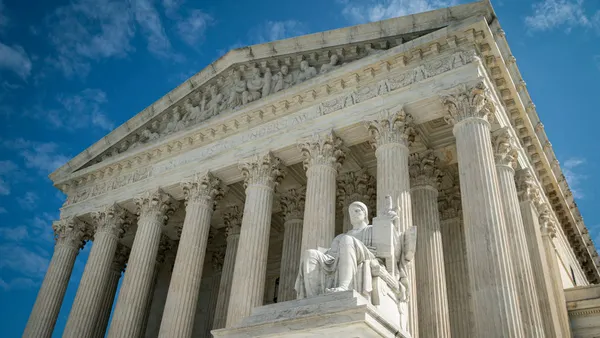UPDATE: Jan. 27, 2022: The U.S. Supreme Court on Jan. 24 declined to revisit the 9th Circuit's ruling in Maner v. Dignity Health.
Dive Brief:
- An employer did not violate Title VII of the Civil Rights Act of 1964 when a supervisor demonstrated favor for his romantic partner over another employee, the 9th U.S. Circuit Court of Appeals ruled (Maner v. Dignity Health, No. 18-17159 (9th Cir., Aug. 20, 2021)).
- A laboratory terminated an employee in 2011, citing poor performance and lack of funding. The worker sued, alleging the lab violated Title VII by shielding a female employee from the impact of reduced funding by eliminating his position.
- Specifically, the worker argued he could make his "paramour preference" claim under Title VII because its prohibition against discrimination based on "sex" "encompasses sexual activity between persons as well as sex characteristics." The worker also held that this theory is supported by the U.S. Supreme Court's 2020 ruling, Bostock v. Clayton County.
Dive Insight:
The 9th Circuit is not the first court to reject a "paramour preference" reading of Title VII. In the 1980s, the 2nd Circuit held that Title VII's "sex" could not mean "sexual liaisons" and "sexual attractions," as a group of male employees argued after being passed over for a promotion that was given to a female employee who had an affair with their supervisor (DeCintio v. Westchester County Medical Center (2nd Cir., 1986)).
A slate of other appellate courts have since adopted the DeCintio rationale in rejecting claims that mirror those in Maner, the 9th Circuit said.
The court also rejected the plaintiff's argument that the high court's Bostock ruling supported his paramour theory. In the Bostock ruling, the Supreme Court decided Title VII's prohibition on sex discrimination includes discrimination based on sexual orientation and gender identity. It introduced a test: A court determines the presence of sex discrimination by asking whether changing an employee's sex would have yielded a different choice by the employer.
"In the 'paramour preference' scenario, the answer is no," the 9th Circuit wrote. "The employer discriminates in favor of a supervisor's sexual or romantic partner and against all other employees because they are not the favored paramour, no matter the sex of the paramour or of the complaining employees … The motive behind the adverse employment action is the supervisor's special relationship with the paramour, not any protected characteristics of the disfavored employees."











